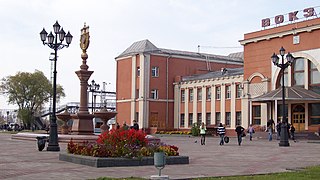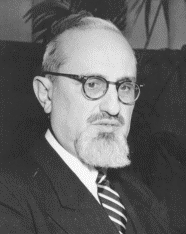Related Research Articles

Judaism is an Abrahamic, monotheistic, and ethnic religion comprising the collective religious, cultural, and legal tradition and civilization of the Jewish people, also sometimes called Israelites. Judaism is considered by religious Jews to be the expression of the covenant that God established with the Children of Israel. It encompasses a wide body of texts, practices, theological positions, and forms of organization. The Torah is part of the larger text known as the Tanakh or the Hebrew Bible, and supplemental oral tradition represented by later texts such as the Midrash and the Talmud. With between 14.5 and 17.4 million adherents worldwide, Judaism is the tenth largest religion in the world.

The Jewish Autonomous Oblast is a federal subject of Russia in the Russian Far East, bordering Khabarovsk Krai and Amur Oblast in Russia and Heilongjiang province in China. Its administrative center is the town of Birobidzhan.

Birobidzhan is a town and the administrative center of the Jewish Autonomous Oblast, Russia, located on the Trans-Siberian Railway, near the China–Russia border. As of the 2010 Census, its population is 75,413, and its official language is Yiddish. Birobidzhan is named after the two largest rivers in the autonomous oblast: the Bira and the Bidzhan. The Bira, which lies to the east of the Bidzhan Valley, flows through the town. Both rivers are tributaries of the Amur.
Messianic Judaism is a modern syncretic Christian religious movement that incorporates some elements of Judaism and Jewish tradition with Evangelical Christianity. The movement emerged in the 1960s and 1970s from the Hebrew Christian movement and the Baptist organization Jews for Jesus founded in 1973 by Conservative Baptist minister Martin Rosen.

Joseph Ber Soloveitchik was a major American Orthodox rabbi, Talmudist, and modern Jewish philosopher. He was a scion of the Lithuanian Jewish Soloveitchik rabbinic dynasty.
Religious pluralism is a set of religious world views that hold that one's religion is not the sole and exclusive source of truth, and thus recognizes that some level of truth and value exists in other religions. As such, religious pluralism goes beyond religious tolerance, which is the condition of peaceful existence between adherents of different religions or religious denominations.
Jewish religious movements, sometimes called "denominations", include different groups which have developed among Jews from ancient times. Today, the main division is between the "traditional Judaism", and Reform, with several smaller movements alongside them. This denominational structure is mainly present in the United States, while in Israel, the fault lines are between Haredi Judaism (Haredim), Religious Zionism (Datim), Masortim (traditional) and Hiloni (secular) Jews.

Conversion to Judaism is the process by which non-Jews adopt the Jewish religion and become members of the Jewish ethnoreligious community. It thus resembles both conversion to other religions and naturalization. The procedure and requirements for conversion depend on the sponsoring denomination. Furthermore, a conversion done in accordance with one Jewish denomination is not a guarantee of recognition by another denomination. Usually, the conversions performed by the more stringent denominations are recognized by the less stringent ones, but not the other way around. A formal conversion is also sometimes undertaken by individuals whose Jewish ancestry is questioned or uncertain, even if they were raised Jewish, but may not actually be considered Jews according to traditional Jewish law.
Jewish leadership has evolved over time. Since the destruction of the Second Temple in Jerusalem in 70 CE, there has been no single body that has a leadership position over the entire Jewish diaspora. Various branches of Judaism, as well as Jewish religious or secular communities and political movements around the world elect or appoint their governing bodies, often subdivided by country or region.

The history of the Jews in Portugal reaches back over two thousand years and is directly related to Sephardi history, a Jewish ethnic division that represents communities that originated in the Iberian Peninsula.

In Search of Happiness is a 2005 Russian documentary film that poetically follows the lives of Boris and Masha Rak, Soviet Jews who in 1934 moved to the Jewish Autonomous Oblast (JAO) created by the Soviet government in Russian Far East. The film won the Best Documentary award in the Russian Film Festival in 2006.
Mordechai Sheiner is an Israeli Orthodox rabbi associated with the Chabad Hasidic movement. Sheiner served as Chief Rabbi of Jewish Autonomous Oblast from 2002 to 2011.
The Birobidzhan Synagogue was established in 2004. The synagogue is in the city of Birobidzhan, which is the capital of the Jewish Autonomous Oblast, the only autonomous oblast of Russia. It is "the first synagogue in Russia to be built partly with state money," according to the Federation of Jewish Communities of the CIS. The Russian government allotted US$ 112,000 to help build the synagogue.

Alexander Aronovich Vinnikov is a Russian politician and formerly the governor of the Jewish Autonomous Oblast.
Lev Grigorievich Toitman was a soldier in World War II. Toitman is known for the "foundation and revival of the local Jewish community" in Birobidzhan.
The history of the Jews in the Jewish Autonomous Oblast (JAO), Russia, began with the early settlements of 1928.
Beit T'shuva is a synagogue located in the Russian city of Birobidzhan. The oldest synagogue in the city, having been established in 1986, it is sometimes referred to as "Birobidzhan's old synagogue". While for years, the congregation's religious services included a blend of Christian and Jewish traditions, in 2005, under its leader of many years, Rabbi Boris "Dov" Kaufman, it underwent a transformation to become a "strictly Jewish" synagogue without any Christian influence.

Igbo Jews are members of the Igbo people of Nigeria who practice a form of Judaism. Judaism has been documented in parts of Nigeria since the precolonial period, from as early as the 1500s, but is not known to have been practiced in the Igbo region in precolonial times.

This article presents the timeline of selected events concerning the history of the Jews in Lithuania and Belarus from the fourteenth century when the region was ruled by the Grand Duchy of Lithuania.
References
- ↑ Emigration to Israel empties 'homeland' for Jews contrived in the Stalinist era Archived 2007-11-27 at the Wayback Machine CNN
- ↑ Stalin's Jewish Republic at 80 BBC
- ↑ Birobidzhan - Back to the Synagogue Washington Post